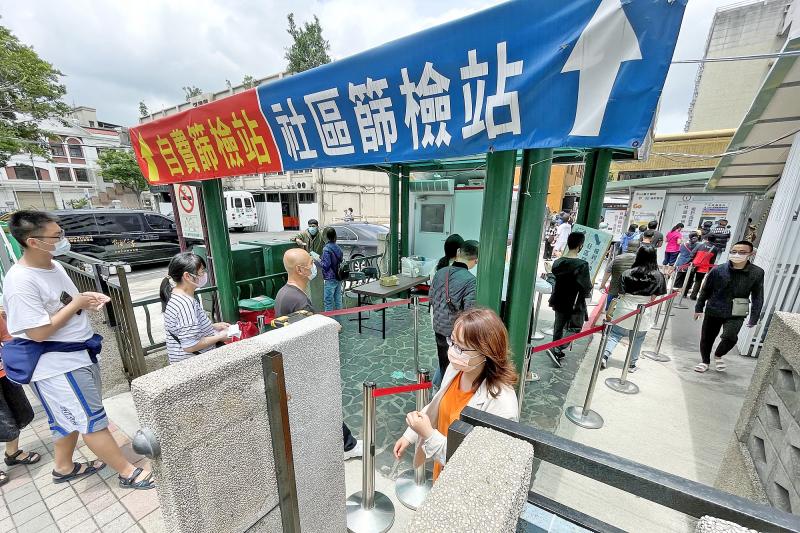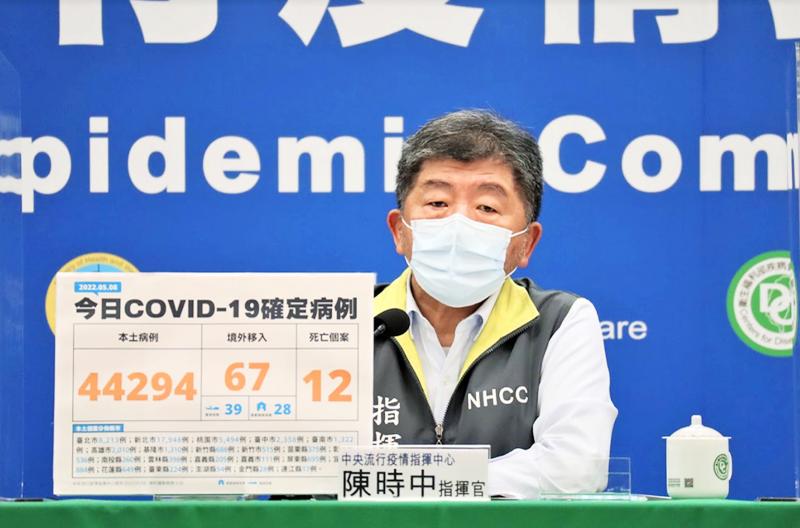The Central Epidemic Command Center (CECC) would consider downgrading COVID-19 from a category 5 notifiable communicable disease to category 4 in July, when the nation’s border controls could also be relaxed, Minister of Health and Welfare Chen Shih-chung (陳時中) said yesterday.
COVID-19 was given the category 5 designation in January 2020, allowing the Centers for Disease Control (CDC) to quarantine suspected cases based on the guidelines for communicable disease prevention.
Taiwan’s latest outbreak might peak at the end of this month or early next month, after which daily caseloads would fall by two-thirds, Chen said, citing outbreaks in other countries.

Photo: CNA
The center would then consider changing the designation for COVID-19 from category 5 to category 4, said Chen, who heads the CECC.
CDC Deputy Director-General Chuang Jen-hsiang (莊人祥), who is the CECC’s spokesman, said that a category 4 designation would still require people with COVID-19 to be quarantined and undergo treatment at a designated institution if necessary.
The difference is that a category 4 disease must be reported within 24 hours to one month of diagnosis depending on the illness, while a category 5 disease must be reported within 24 hours, he said.

Photo courtesy of the Central Epidemic Command Center
Separately, Chen was asked about a report by British newspaper the Daily Telegraph that Taiwan could face “unprecedented death rates by this summer” due to its “little natural immunity and suboptimal vaccination rates among the vulnerable.”
“While the center will take in theoretical predictions for reference, we will continue to pursue the good and avoid the bad by doing our best to keep the pandemic situation under control,” Chen said.
The CECC yesterday reported 44,361 new COVID-19 cases — including 67 imported — and 12 deaths from the disease.
Although it was the second consecutive day that the nation’s daily caseload surpassed 40,000, it was a slight drop from the 46,377 domestic cases reported on Saturday.
Chen said the decline was likely due to fewer people getting tested over weekends.
The deaths reported yesterday involved people aged 60 to 100. Six of them had received no COVID-19 vaccine, two had received a single dose, one received two doses and three received three doses.
The CECC also reported 106 people with moderate symptoms and 12 with severe symptoms.
Of the 288,515 domestic cases recorded in Taiwan from Jan. 1 to Saturday, 606 have been classified as moderate infections and 101 as severe, accounting for 0.21 percent and 0.04 percent of the total respectively. The rest were asymptomatic or mild cases, the CECC said.
New Taipei City yesterday reported the most new COVID-19 cases with 17,948, followed by Taipei with 8,213 and Taoyuan with 5,494.
Taichung reported 2,358 cases, Kaohsiung 2,010, Tainan 1,322, Keelung 1,310, Yilan County 884, Pingtung County 695, Hsinchu County 688, Hualien County 649, Changhua County 536 and Hsinchu City 515.
Yunlin County reported 398 cases, Miaoli County 375, Nantou County 260, Taitung County 224, Chiayi County 205, Chiayi City 111, Penghu County 54, Kinmen County 28 and Lienchiang County 17.
In other developments, the Ministry of Economic Affairs yesterday confirmed that the four major convenience store chains in Taiwan — 7-Eleven, FamilyMart, Hi-Life and OK Mart — would start selling rapid test kits again from today.
The prices would be based on market demand, the ministry said, adding that it did not yet have access to details such as the brands and number of tests per kit.
Rapid test kits are available to the public mainly through a government rationing system that was launched on April 28, allowing people with a government-issued ID or National Health Insurance card to buy a five-piece test kit at a controlled price of NT$500.

The CIA has a message for Chinese government officials worried about their place in Chinese President Xi Jinping’s (習近平) government: Come work with us. The agency released two Mandarin-language videos on social media on Thursday inviting disgruntled officials to contact the CIA. The recruitment videos posted on YouTube and X racked up more than 5 million views combined in their first day. The outreach comes as CIA Director John Ratcliffe has vowed to boost the agency’s use of intelligence from human sources and its focus on China, which has recently targeted US officials with its own espionage operations. The videos are “aimed at

STEADFAST FRIEND: The bills encourage increased Taiwan-US engagement and address China’s distortion of UN Resolution 2758 to isolate Taiwan internationally The Presidential Office yesterday thanked the US House of Representatives for unanimously passing two Taiwan-related bills highlighting its solid support for Taiwan’s democracy and global participation, and for deepening bilateral relations. One of the bills, the Taiwan Assurance Implementation Act, requires the US Department of State to periodically review its guidelines for engagement with Taiwan, and report to the US Congress on the guidelines and plans to lift self-imposed limitations on US-Taiwan engagement. The other bill is the Taiwan International Solidarity Act, which clarifies that UN Resolution 2758 does not address the issue of the representation of Taiwan or its people in

US Indo-Pacific Commander Admiral Samuel Paparo on Friday expressed concern over the rate at which China is diversifying its military exercises, the Financial Times (FT) reported on Saturday. “The rates of change on the depth and breadth of their exercises is the one non-linear effect that I’ve seen in the last year that wakes me up at night or keeps me up at night,” Paparo was quoted by FT as saying while attending the annual Sedona Forum at the McCain Institute in Arizona. Paparo also expressed concern over the speed with which China was expanding its military. While the US

SHIFT: Taiwan’s better-than-expected first-quarter GDP and signs of weakness in the US have driven global capital back to emerging markets, the central bank head said The central bank yesterday blamed market speculation for the steep rise in the local currency, and urged exporters and financial institutions to stay calm and stop panic sell-offs to avoid hurting their own profitability. The nation’s top monetary policymaker said that it would step in, if necessary, to maintain order and stability in the foreign exchange market. The remarks came as the NT dollar yesterday closed up NT$0.919 to NT$30.145 against the US dollar in Taipei trading, after rising as high as NT$29.59 in intraday trading. The local currency has surged 5.85 percent against the greenback over the past two sessions, central